Best Internal Linking Tools For SEO: Top 7 Picks Of 2025

Internal links are really important for website SEO.
But let’s face it, adding them manually can be really time-consuming, especially when you already have hundreds of pages on your site.
And that’s where the internal linking tools come in. They save hours of manual work and make your site's internal link structure much stronger.
Let’s break down the best internal linking tools for SEO with their features, pros, cons, and more, and find out the best one for your needs.
Here’s a quick breakdown of the top seo internal linking tools of 2025:
-
Best Overall Tool - SEOWriting combines powerful internal linking with content creation capabilities, making it the most complete solution for websites focused on content marketing.
-
Best All-in-One SEO Plugin - RankMath includes helpful internal linking suggestions alongside comprehensive SEO features at an affordable price point.
-
Best for WordPress Sites - Link Whisper offers the perfect balance of automation and control specifically designed for WordPress users.
-
Best on a Budget - Internal Link Juicer provides excellent value with its rule-based automation at an affordable price point.
-
Best for Technical SEO Experts - Screaming Frog with its detailed analysis capabilities gives technical SEO professionals the data they need to optimize internal linking structures.
-
Best Free Option - Yet Another Related Posts Plugin (YARPP) delivers solid basic functionality without any cost.
-
Best for Professional Content Publishers - InLinks with its semantic understanding and topic clustering features helps publishers build authoritative content hubs.
7 Best Internal Linking Tools For SEO In 2025
#1. SEOWriting – Best AI-Powered Internal Linking And SEO Content Creation Tool

SEOWriting is an AI-powered tool that simplifies internal linking while enhancing overall SEO content creation. It combines internal linking automation with advanced content optimization, making it a standout option for users who need both precision and efficiency.
What Makes It Stand Out For Internal Linking:

Automatic Internal Linking Setup – SEOWriting connects directly to your WordPress site, enabling seamless internal linking with minimal effort.

Customizable Link Placement – Offers three placement options – at the top, evenly throughout, or at the bottom of your content, ensuring strategic link distribution.

Exclusion Options – Lets you exclude specific pages or categories to avoid irrelevant links and maintain quality.

Contextual Enrichment – Enhances links by analyzing the content of linked pages, ensuring they add value to your article.

Dofollow and Nofollow Selection – Gives full control over link attributes, helping you optimize for SEO strategy.
SEO Features Beyond Internal Linking:
SEOWriting isn’t just for linking. It’s a complete AI writing tool with multiple features to optimize your content:

One-Click SEO Content Creation – Quickly generates SEO-optimized articles that align with target keywords.

Bulk Content Generation – Allows you to create multiple blog posts at once, saving significant time.
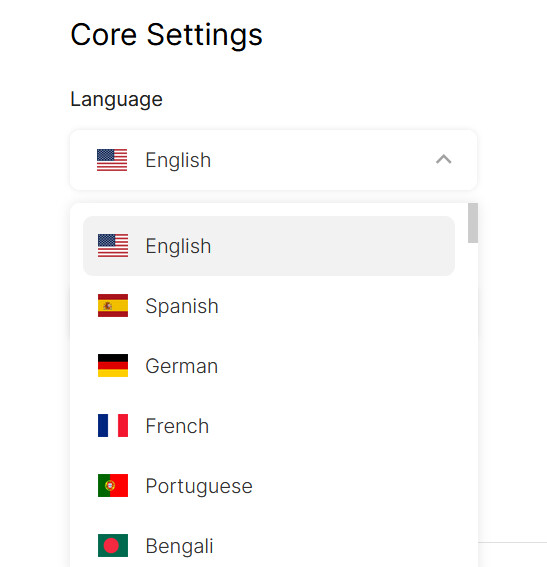
Multi-Language Support – Generates blog posts in 48 languages, making it ideal for global audiences.

AI Image Generator – Creates visuals for blog posts, enhancing user engagement.

Brand Voice Customizer – Lets you tailor the tone and style of your content to align with your brand.

SEO Blog Outline Editor – Simplifies content planning with AI-assisted blog outline suggestions.
Pros:
-
Automates internal linking with precision and relevance.
-
Provides advanced content optimization features alongside linking.
-
Highly customizable options for link placement and attributes.
-
Supports bulk content creation, enhancing efficiency.
Cons:
-
Requires initial setup for WordPress plugin integration.
-
Some advanced features may take time to fully explore.
Pricing:
SEOWriting offers flexible pricing plans starting at just $19/month, making it accessible for both small businesses and enterprises. You also get a free plan through which you can create upto 5 articles.
With its professional plan starting at $79/month, you get full feature access including 250 article generation, internal linking, external linking, and multiple custom brand voices.
Who It’s Best For:
SEOWriting is perfect for content creators, SEO professionals, and businesses looking to streamline internal linking while creating high-quality, optimized content. Its combination of AI-powered automation and customization makes it stand out among other tools, especially for users managing large content libraries or global SEO strategies.
#2. RankMath – Affordable And Feature-Packed SEO Plugin
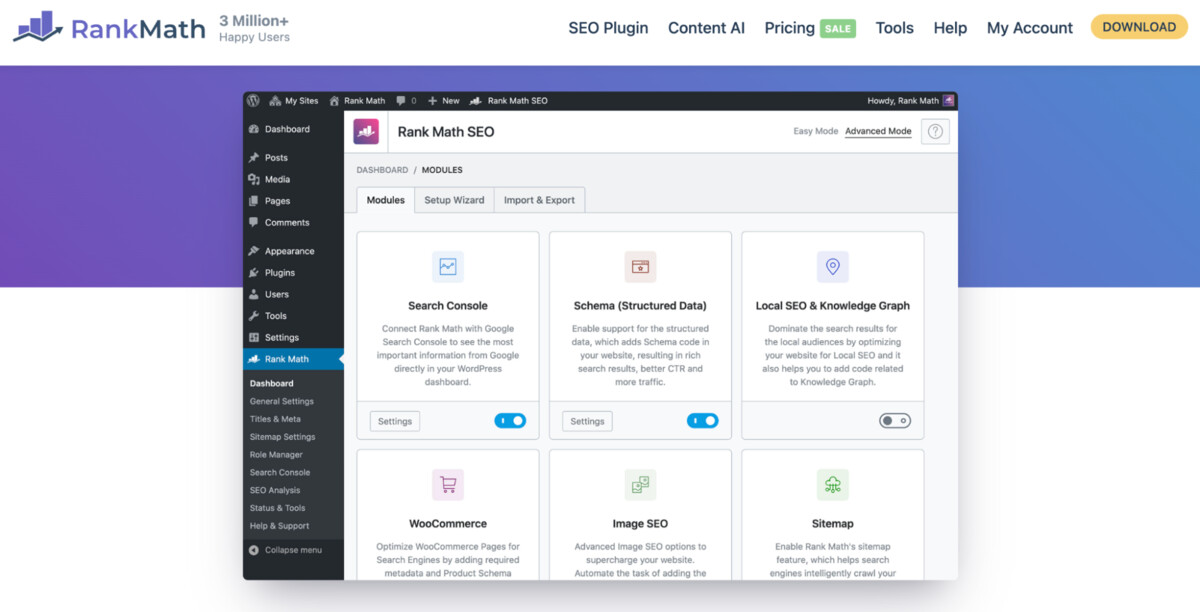
RankMath stands out as a complete WordPress SEO plugin that offers powerful internal linking capabilities alongside its feature-packed SEO features. What makes it particularly valuable is its balance of advanced features and affordability.
Key Internal Linking Features:
-
Smart Link Suggestions: As you write content, RankMath analyzes your website to recommend relevant internal links based on your existing content, ensuring contextual relevance.
-
Breadcrumb Navigation Support: RankMath helps you implement SEO-friendly breadcrumb navigation that adds useful internal links to your site structure.
-
Link Counter: The plugin counts and displays the number of internal and external links on each page, helping you identify content that needs more internal links.
-
Complete On Page SEO Support: Along with the internal linking feature, the plugin helps you optimize your content’s overall on page SEO.
How To Use It?
When you're writing a new blog post in WordPress, RankMath's sidebar will show you related content from your site that you can link to with a single click.
It doesn’t offer advanced internal linking features like other tools such as Link Whisper offer. However, the biggest advantage is you get all the SEO features along with internal linking in one tool.
Pros:
-
Includes strong SEO features beyond just internal linking.
-
Intuitive interface that even beginners can navigate.
-
Offers linking suggestions while you write content.
-
Affordable with many features available in the free version.
Cons:
-
Advanced linking rules require the premium version.
-
Some features have a learning curve for complete beginners.
-
Limited functionality for non-WordPress sites.
Pricing:
RankMath’s free version includes robust features, while the premium plan starts at $49.99/month, offering additional analytics and automation. This pricing makes it highly cost-effective compared to similar tools.
Who It’s Best For:
RankMath is ideal for WordPress site owners who want an all-in-one SEO solution that includes powerful internal linking features. It's especially valuable for content-heavy websites and blogs where manual linking would be time-consuming.
Related Read: Top AI Writing Tools For SEO Content Creation
#3. Link Whisper – Best For Strong AI-Powered Internal Linking
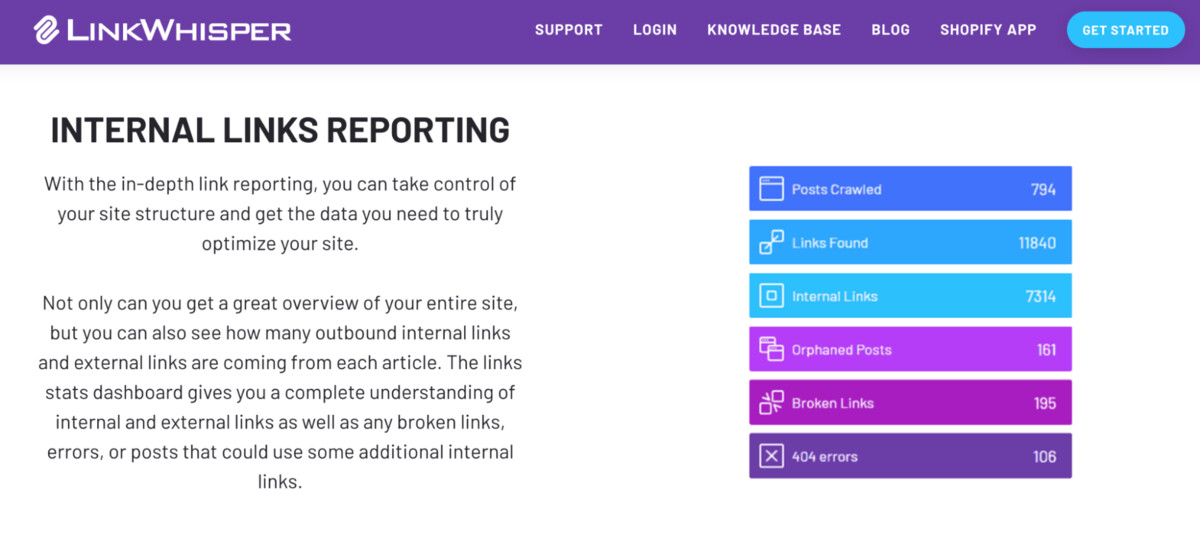
Link Whisper uses advanced AI technology to analyze your content and automatically suggest relevant internal links. This WordPress plugin stands out for its intelligent link recognition and time-saving automation features.
Key Internal Linking Features:
-
AI-Powered Suggestions – Recommends contextually relevant links as you write, improving link quality and relevance.
-
Auto-Linking for Keywords – Automates the process by letting you link specific keywords to target pages.
-
Broken Link Detection – Monitors your site for broken links and helps you fix them quickly.
-
Comprehensive Link Reports – Highlights linking opportunities and tracks changes, keeping your strategy on point.
How To Use It?
When you have a large content library, Link Whisper can help you quickly identify older posts that should link to your newer content.
The bulk suggestion feature lets you review and implement dozens of internal links in minutes instead of hours.
Pros:
-
Provides smart, accurate link suggestions.
-
Automates repetitive linking tasks for efficiency.
-
Identifies and fixes broken links to maintain user experience.
-
Offers detailed reports for optimizing linking strategy.
Cons:
-
Requires a subscription for full features.
-
Limited integration options outside WordPress.
Pricing:
Plans start at $97/year for single-site use. The cost increases for multi-site licenses but it’s worth it considering its strong AI-powered internal link suggestions.
Who It’s Best For:
Link Whisper is ideal for bloggers, small businesses, and SEO enthusiasts managing growing content libraries. Its AI capabilities and automation make it perfect for users seeking fast and accurate internal linking solutions.
Related Read: Best Blog Post Formatting Tips
#4. Internal Link Juicer – Best For Keyword-Based Automation
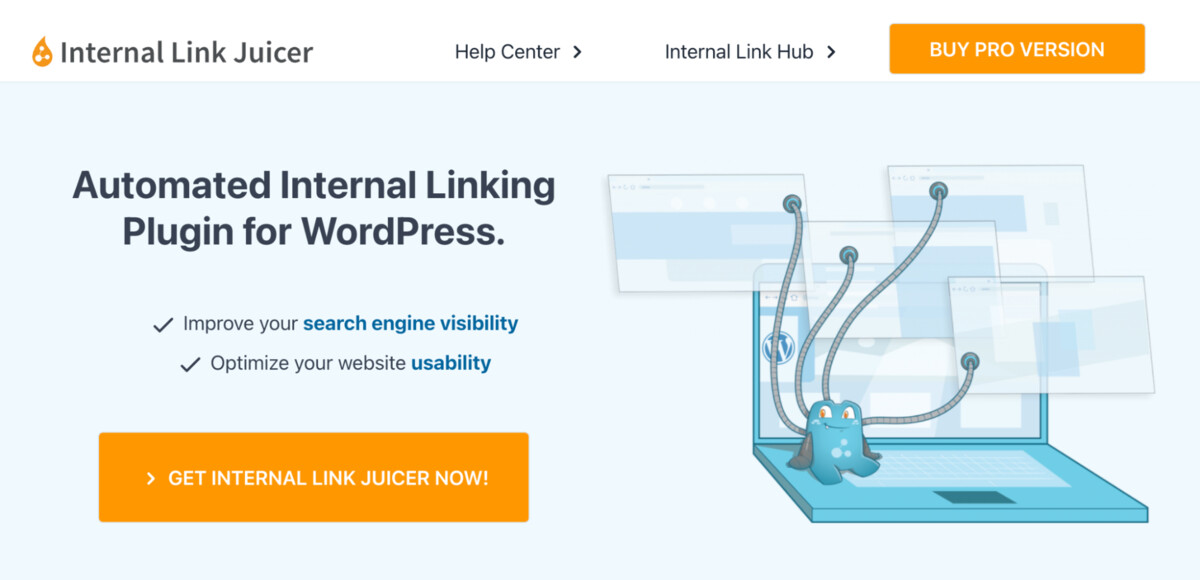
Internal Link Juicer focuses on automating internal linking using keywords as its core functionality. It is designed for users who want to build internal links effortlessly while maintaining full control over anchor text and placement.
What Makes It Stand Out For Internal Linking:
-
Dynamic Keyword Rules – Automatically links specified keywords to target pages across your site.
-
Anchor Text Variability – Rotates anchor text to avoid over-optimization, improving SEO balance.
-
Custom Placement Options – Allows you to control where links appear in your content.
-
Comprehensive Reporting – Tracks which links are added and their performance.
How To Use It?
For e-commerce sites, you can set up rules to automatically link product category mentions to relevant category pages. The link limit controls prevent over-linking while ensuring consistent internal linking across your product catalog.
Blog owners can use the anchor text variations to create natural-looking internal links that avoid repetitive anchor text, which helps prevent potential over-optimization.
Pros:
-
Automates linking with customizable keyword rules.
-
Reduces risk of over-optimization with varied anchor text.
-
Provides control over link placement.
-
Tracks link performance with detailed reports.
Cons:
-
Limited to WordPress sites.
-
Some advanced features require manual setup.
Pricing:
Internal Link Juicer starts at $69.99/year for 1 site license. Also, offers a free plan but with limited features.
Who It’s Best For:
This tool is best for bloggers, affiliate marketers, and content-heavy sites that need fast and consistent keyword-based linking. Its automation features make it perfect for scaling internal linking across a growing site
Read More: How To Write The Best AI-Powered SEO Content?
#5. Screaming Frog’s SEO Spider – Best For Link Auditing And Optimization
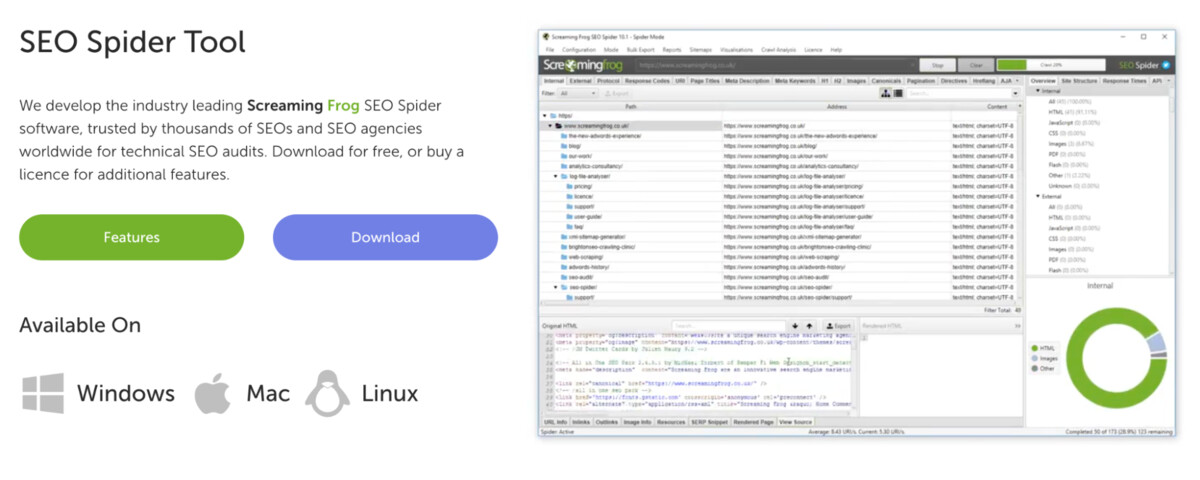
Screaming Frog’s SEO Spider is a highly specialized tool for auditing and optimizing internal links. It provides detailed crawl reports to help identify and fix link-related issues across your site.
What Makes It Stand Out For Internal Linking:
-
Crawl Reports – Scans your site to find broken or orphaned internal links.
-
In-Depth Link Analysis – Provides detailed data on link structure, anchor text, and placement.
-
Redirect Detection – Identifies unnecessary redirects, helping streamline link flow.
-
Custom Filtering Options – Lets you segment and analyze links by type or attribute for better control.
How To Use It?
During site audits, use Screaming Frog to identify pages with no internal links pointing to them and incorporate them into your site structure.
For large site migrations, use the tool to ensure your internal linking structure remains intact and identify any broken links that need fixing before they impact your SEO performance.
Pros:
-
Offers detailed crawl data for link optimization.
-
Identifies broken and orphaned links efficiently.
-
Helps streamline linking with redirect detection.
-
Custom filters provide actionable insights.
Cons:
-
Requires technical expertise to interpret data.
-
Not automated; best suited for manual analysis.
Pricing:
The tool costs $259 per year, which is affordable given its detailed functionality for SEO professionals.
Who It’s Best For:
Screaming Frog is best for technical SEO professionals and web developers needing detailed link analysis to optimize large or complex websites. Its auditing capabilities make it essential for advanced link troubleshooting.
Related Read: SEO Writing vs. Copywriting: What’s The Difference?
#6. Yet Another Related Posts Plugin (YARPP) – Best For Related Posts Linking

YARPP focuses on related posts linking, helping websites improve user engagement by suggesting and linking to similar content automatically.
What Makes It Stand Out For Internal Linking:
-
Automatic Related Posts Linking – Displays related content at the end of articles to enhance user engagement.
-
Customizable Matching Criteria – Lets you define how related posts are selected, such as by tags, categories, or keywords.
-
Widget Integration – Adds related posts to sidebars or footers for consistent visibility.
-
Flexible Display Options – Offers various layouts like lists or thumbnails to suit site design.
How To Use It?
For content-heavy blogs, YARPP automatically creates relevant internal links between related articles, encouraging readers to explore more of your content. The thumbnail display option increases click-through rates compared to text-only links.
Websites can use the relevance controls to ensure the most timely and topically related articles appear, keeping users engaged with current content while building a stronger internal link structure.
Pros:
-
Improves user engagement with related content suggestions.
-
Provides customizable criteria for accurate matching.
-
Offers multiple display formats to fit different designs.
-
Simple to integrate with most WordPress themes.
Cons:
-
Limited functionality outside related posts.
-
May require optimization for sites with heavy traffic.
Pricing:
YARPP is also available as a free-to-use plugin.
Who It’s Best For:
YARPP works best for content publishers, bloggers, and news sites focused on increasing page views and time on site while improving internal linking. It's particularly valuable for sites where related content recommendations enhance the user experience.
#7. InLinks – Best For Entity-Based Linking And Semantic SEO
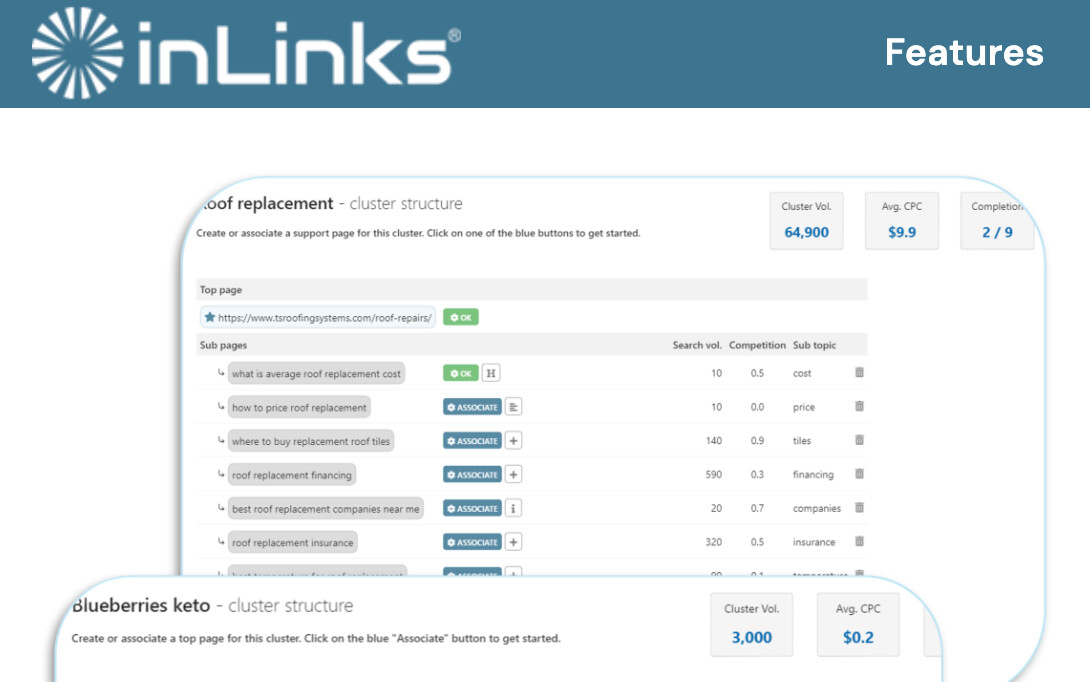
InLinks uses entity-based analysis to create precise internal links, setting it apart from keyword-driven tools. It’s designed for advanced users who want to improve rankings through semantic SEO strategies.
What Makes InLinks Stand Out For Internal Links:
-
Entity-Based LinkSuggestions – InLinks analyzes entities like topics or concepts instead of relying on keywords, ensuring deeper content connections.
-
Knowledge Graph Integration – The knowledge graph feature organizes your site’s content for better search engine understanding.
-
Content Gap Analysis – Content gap analysis highlights pages lacking internal links, helping you optimize your site.
-
Automated Link Placement – Automated linking allows customization of placement and link attributes, balancing efficiency and control.
How To Use It?
When organizing your content into topic clusters, InLinks helps identify the best internal linking opportunities to strengthen topical authority. The semantic approach ensures your links connect truly related content, not just pages that share keywords.
For news and publishing sites, the entity recognition helps create contextually relevant links even when exact keyword matches aren't present, providing a more natural user experience.
Pros:
-
Focuses on entities for smarter linking.
-
Builds site authority through knowledge graphs.
-
Identifies content gaps for optimization.
-
Offers control over link placement and attributes.
Cons:
-
Complex setup for new users.
-
Higher pricing compared to simpler tools.
Pricing:
Starts at $49/month, with a 7-day free trial. It’s a higher-cost option but delivers advanced internal linking and content optimization features.
Who It’s Best For:
InLinks is best for SEO experts and large websites needing entity-based optimization. Its semantic approach makes it a great choice for competitive industries or content-heavy sites aiming for advanced SEO strategies.
Related Read: Best SEO Copywriting Tips For Beginners
How To Pick The Best Internal Linking Tool For SEO?
Here are some of the top tips that will help you pick the best SEO internal linking tool for your website:
1. Consider Your Website’s Size And Complexity
For small websites, tools like YARPP provide simple, budget-friendly solutions. Larger websites benefit from advanced tools like Link Whisper, which offer in-depth analytics and automation to handle complex link structures.
2. Look For Automation Features
Automation saves time, especially for content-heavy sites. Tools like SEOWriting stand out for their AI-powered internal linking, which identifies and integrates relevant links seamlessly.
3. Evaluate Integration With Your CMS
If you use WordPress, ensure the tool integrates smoothly. Plugins like Rank Math are great for WordPress users. For non-WordPress sites, tools like InLinks or Screaming Frog offer more flexibility.
4. Check For Analytics And Reporting
Data-driven insights help refine your linking strategy. Tools like InLinks and Link Whisper offer detailed reports on link performance, showing where to improve for better SEO results.
Internal Linking Best Practices for 2025
Here are some of the latest SEO best practices to increase the effectiveness of your internal linking strategy:
Focus on User Experience First
-
Use descriptive anchor text that clearly indicates what users will find when they click.
-
Ensure links are visually distinguishable from regular text.
-
Add internal links that provide genuine value, not just for SEO benefit.
-
Place important links higher in the content where they're more likely to be clicked.
Balance Link Distribution
-
Aim for a minimum of 3-5 internal links per page, ensuring no page is orphaned.
-
Limit maximum links to around 100 per page to avoid appearing spammy.
-
Give more internal links to your pillar content pages.
-
Ensure newer content links back to relevant older content.
Optimize Anchor Text Strategically
-
Use relevant keywords in anchor text, but vary phrasing to avoid over-optimization.
-
Keep anchor text concise (2-5 words) and descriptive of the destination page.
-
Avoid generic anchor text like "click here" or "read more."
-
Match anchor text to the target page's topic, not necessarily its exact title.
Maintain a Healthy Link Structure
-
Keep all pages within 3-4 clicks from your homepage (shallow site architecture).
-
Use breadcrumbs for hierarchical sites like e-commerce stores.
-
Fix broken internal links immediately as they waste link equity.
-
Review your internal linking structure quarterly to identify gaps and opportunities.
Final Thoughts
Internal linking is a critical part of any SEO strategy. From simple plugins like WILO to advanced tools like InLinks, each option offers unique benefits based on your needs.
SEOWriting provides an all-in-one solution with advanced automation and content optimization, making it a standout choice for both beginners and professionals.
Ready to improve your website’s internal linking? Try SEOWriting for FREE now!
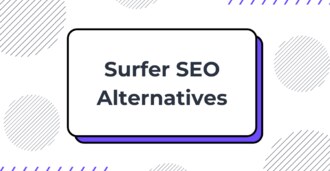
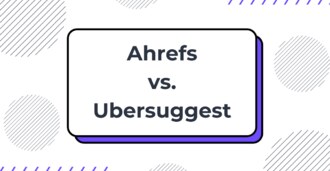

Write 10X Faster With AI-Powered Content
Create SEO-optimized articles in 15 minutes instead of 5 hours. Join 50,000+ content creators who generate content that ranks on top positions on Google. Save up to 80% of your time while getting 2X better results.
Try for Free →
